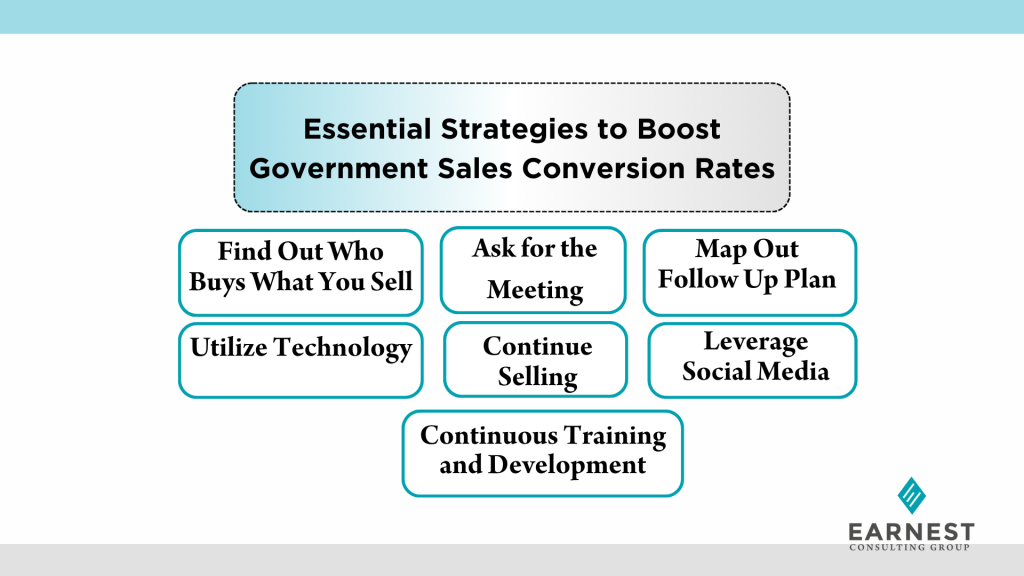Seven Essential Strategies to Boost Government Sales Conversion Rates
May 17, 2024 | Business Development, Government
Image made in Canva
Sales in any industry present unique challenges and opportunities. Certain strategies can give you an edge when selling to the federal government. In this article, we will explore seven proven tips for developing a successful sales strategy that stands out in this competitive landscape.
1. Find Out Who Buys What You Sell
While sales are sales, a few things about sales to the Federal government are unique. One of those things is customer data is public record. So this means you can get a very good idea of which agency buys what you sell, which contracting officer was in charge of the contract, what if any, contract vehicle was used to buy it, who it was purchased from when it was bought, and how much it costs. It takes a lot of guesswork to determine which people you target. Purchasing a list of all government buyers and spamming them with a mass email does not replace this process. In ANY sales, it is better to be laser-focused than “spray and pray.” Federal government sales give you the information to be laser-focused.
2. Ask for the Meeting
In your phone call, email, or voicemail, don’t ask questions like, “Would you be open to” or “Would you like to?” instead. Let’s have a (quick conversation, meeting, capabilities brief). How about Thursday the 16th at 2 PM. It will only take 15 minutes. Just make sure your ask is at the very least two weeks out. People think they’re too busy today or this week, but how many know they will be too busy two, three, or four weeks out? Yes. Contracting officers are busy, but the less work you do to meet with you, the more likely they will make time for you. They’ll ignore calls or emails if you don’t come off as confident and have clear objectives.
3. Map Out Follow Up Plan
Don’t just reach out once or have one meeting. At least conceptually, plan to follow up with another question, news about your company, or an article that you think is relevant to their business. The frequency will depend on whether an opportunity is eminent in the next few weeks/months vs. in the next year or so. Instead of obsessing over the perfect frequency or time to email or call, just focus on executing. With that said, if you’re dying to know the best time to call or email a government prospect, it was yesterday.
4. Utilize Technology
There are other examples of technology that you should leverage, but here, I will focus on one—CRM. You are putting yourself at a massive disadvantage if you don’t have a CRM. I often ask my prospects and new clients. Where are you documenting your pipeline and the next step required for that deal or opportunity? They respond, “It’s all up here,” pointing to their head with their pointer finger. Is your reason because you can’t afford one? There are multiple free ones out there. Streak and Hubspot are two that have a free version.
5. Continue Selling
The easiest person to sell to is an existing client who already sees your value and appreciates how well you perform. Instead of asking, “What else can we do for you?” be a little more proactive than that. Interview the people working on the contract. What have they been working on? What problems do they see? How can your company help the agency overcome those obstacles? Where are they having issues finding good staff augmentation?
6. Leverage Social Media.
Think of a topic a prospect might be interested in and write an article about it. It doesn’t have to be a 10-page paper—it should be 300-500 words. Done is better than perfect. Connect with them on LinkedIn and then share the article with them. You’re sharing knowledge, not selling. You’re also building familiarity and trust.
7. Continuous Training and Development
I’ve been working in government sales for 20 years and learned a lot! I would consider myself to be an expert. However, it doesn’t mean I still don’t have room for improvement, training, and development. As an employee, advocate for yourself and ask for training. Show your boss your objectives and the return on investment the company could see with the extra knowledge. As a business owner, you have to continually “sharpen the saw,” as Stephen Covey used to say. But don’t leave your employees out of sharpening their saw. I saw an employee survey a few years back that revealed one of the biggest things employees want is more training. Think of it as a way to retain them.
Selling to the federal government requires a proactive and strategic approach. Remember, consistency and a long-term perspective are critical, as government sales often involve a lengthy process and a commitment to building relationships. Which of the following is the most essential tip for salespeople looking to succeed in selling to the federal government? Why is that?
« Back to Blog Home




